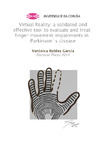Virtual Reality : a validated and effective tool to evaluate and treat finger movement impairments in Parkinson's disease

Use this link to cite
http://hdl.handle.net/2183/13998Collections
- Teses de doutoramento [2227]
Metadata
Show full item recordTitle
Virtual Reality : a validated and effective tool to evaluate and treat finger movement impairments in Parkinson's diseaseAuthor(s)
Directors
Cudeiro Mazaira, Francisco JavierArias, Pablo
Date
2014Center/Dept./Entity
Universidade da Coruña.Departamento de Bioloxía Celular e MolecularAbstract
[Abstract]Virtual Reality (VR) is a promising tool in neurorehabilitation because it promotes functional, motivational and challenging activities, optimizing exercise. Importantly, VR facilitates the imitation process by customizing, controlling and presenting movements to be observed and imitated.
This thesis sought to validate a Virtual Reality System as a tool to evaluate impairments in repetitive movements in Parkinson¿s disease, and to study the effect of a Virtual Reality Therapy based on imitation as a possible therapeutic strategy to facilitate motor learning and to improve motor function in the disease. To achieve these goals a set of studies were conducted to evaluate a combination of behavioural and neurophysiological variables, by using kinematic, electromyographic, and transcranial magnetic stimulation techniques.
The results demonstrated that the Virtual Reality System designed is a valid tool to evaluate alterations in rhythm formation in people with Parkinson's disease, based on the finger tapping test. Besides, an intervention based on movement imitation in VR has positive after-effects in clinical signs, such as reducing hypometria, also the patient¿s corticospinal excitability changed towards a more physiological profile.
Keywords
Enfermedad de Parkinson
Realidad virtual en medicina
Readaptación
Realidad virtual en medicina
Readaptación
Rights
Os titulares dos dereitos de propiedade intelectual autorizan a visualización do contido desta tese a través de Internet, así como a súa reproducción, gravación en soporte informático ou impresión para o seu uso privado e/ou con fins de estudo e de investigación. En nengún caso se permite o uso lucrativo deste documento. Estos dereitos afectan tanto ó resumo da tese como o seu contido Los titulares de los derechos de propiedad intelectual autorizan la visualización del contenido de esta tesis a través de Internet, así como su repoducción, grabación en soporte informático o impresión para su uso privado o con fines de investigación. En ningún caso se permite el uso lucrativo de este documento. Estos derechos afectan tanto al resumen de la tesis como a su contenido





